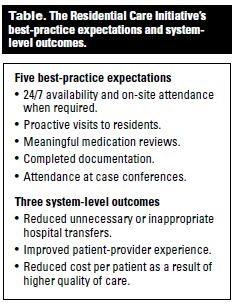- Managing your Practice
-
- Your Benefits
-

Introducing the ultimate Club MD experience
From work to play, and everything in between, we provide you with access to hundreds of deals from recognizable, best-in-class brands, elevating every facet of your life – from practice supports to entertainment, restaurants, electronics, travel, health and wellness, and more. Your Club MD membership ensures that these deals are exclusive to you, eliminating the need to search or negotiate.
Welcome to the ultimate Club MD experience. Your membership, your choices, your journey.
-
- Advocacy & Policy
-
- Collaboration
- News & Events
-

Stay Informed
Stay up to date with important information that impacts the profession and your practice. Doctors of BC provides a range of newsletters that target areas of interest to you.
Subscribe to the President's Letter
Subscribe to Newsletters
-
- About Us
-
The Residential Care Initiative: Improving care for seniors around the province
March 5, 2018
News
The Residential Care Initiative (RCI) was launched by the General Practice Services Committee in 2014 to improve care for seniors living in BC care facilities. RCI projects are being carried out by divisions of family practice—independent non-profit organizations funded by Doctors of BC and the Ministry of Health through which doctors are effecting grassroots health care change.
All divisions of family practice in BC are now working on RCI projects, meaning that 97% of eligible 30,000 residential care beds in the province are covered by projects funded by the initiative. The Residential Care Initiative is already making a significant impact on seniors’ health outcomes and access to care.
 How the Residential Care Initiative works
How the Residential Care Initiative works
The success of the RCI is gauged by whether a series of goals are met. These goals are structured as five best-practice expectations and three system-level outcomes. All RCI projects are evaluated with these goals in mind, and data show successes are now being achieved around the province. Here’s how division projects are meeting the three system-level outcomes.
Reducing unnecessary hospital transfers
To meet this outcome, doctors are improving access to regular medical care at facilities, evaluating more problems on-site, creating after-hours call systems, ensuring that medications are reviewed regularly, and clearly documenting end-of-life plans. Some successes achieved through this work include:
- Hospital transfers from facilities in Nelson have decreased by 34% from 2015/16 to 2016/17.
- Emergency transfers in the Fraser Northwest region have been reduced by 5%, acute care admissions have been reduced by 9%, and the length of ER stays has been reduced by 19%.
- Patient transfers to the ER from Mission care facilities have decreased by 33%.
 Improved patient and provider experiences
Improved patient and provider experiences
Because care facilities are usually the last home for residents, doctors are committed to ensuring that these patients can live and die with dignity. When more doctors regularly visit facilities, they can better support their patients and take the time to provide complex care when needed. Providing a consistent level of care improves residents’ health and quality of life, and enables doctors to support one another and share their workload. Divisions’ achievements in improving the experience of patients and providers through better physician coverage include:
- All residential care patients in the Fraser Northwest region (New Westminster, Coquitlam, Port Moody, and Port Coquitlam) are now attached to a most responsible physician (1722 beds in total).
- 80% of eligible residential care patients in Richmond are now attached to an RCI physician, and an after-hours call group of 13 physicians is providing continuity and coordination of care for residents.
- Vancouver Division has increased the number of residential care GPs by almost 50%, and a mechanism is now in place to ensure that all patients in Vancouver long-term care facilities are connected with a family doctor.
- Victoria Division has developed an after-hours call system coving residents at all 29 facilities in the region. Facilities can reach a physician in less than five minutes by calling one convenient number.
Reduced costs per patient with higher quality of care
Doctors and staff at residential care facilities are lowering system costs through efforts to reduce unnecessary or harmful medications, reduce hospital transfers, and increase on-site care by GPs who know the patient (preventing duplication in the use of specialist, lab, and investigative resources).
- Meaningful medication reviews are reducing medication costs in Victoria, Fraser Northwest, and Mission.
- Fraser Northwest, Victoria, and Vancouver divisions have implemented after-hours call systems through which patients can access 24/7 care from a physician, saving hospital transfer and ER costs.
- South Okanagan Similkameen Division studied medication wastage at local care facilities, creating a report that recommends testing policy changes to address wastage issues. Solving the medication wastage issues detailed in the report could save the province $550,000 per year.
- Data from Fraser Northwest region show that their work to reduce emergency transfers has led to cost savings of more than $1.5 million to the health care system in less than two years.
RCI work continues to improve patient care
These are only a few examples of the RCI work being done by divisions of family practice. As more division projects are evaluated, more information will be available about how the initiative is improving care for residential care home patients in communities around the province.
Click here to read a more detailed article about divisions’ residential care projects.




